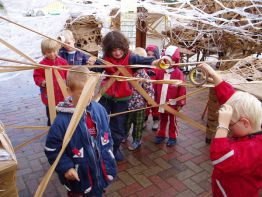Project Aim
Making Waste Work aimed to minimise the volume of waste produced, manage it in a more sustainable way and improve public awareness of waste issues.
Project implementation and results
One of the main achievements of the Making Waste Work was the production of a waste strategy and accompanying reports to describe the project activities and hence guide others in best practice for reducing and managing waste. In particular the raising of public motivation and awareness has been successfully piloted as a main aim for many of the local implementation projects.
Pilot projects
Within 17 pilot projects the project has clearly demonstrated a model of good practice in working together to develop better ways to manage waste, change public attitudes and create jobs within small businesses working in the waste industry.
Innovative solutions
Tangible examples for project results are for instance that the city Stockton, UK has reaped huge rewards through cross-fertilisation in terms of inspiration for innovative developments, which have manifested themselves in the installation of the recycling shed on the civic amenity site and the creation of an internet exchange portal for commercial waste as a resource. Furthermore, participation in the Making Waste Work project has enabled the municipality of Falköping, Sweden, to progress with biogas development, partially related to the LIP ‘Collecting organic waste from blocks of flats’. In Norway, the project has lead to improvements to the system of collecting household waste in Moss Kommune.
Joint transnational strategy
Making Waste Work consistently found that public awareness and education was a key factor in developing new waste management systems and behaviour. Without transnational cooperation, the results of the project could not have been achieved.
Impact of the project
Long-term achievements and policy shaping
Key findings of the project particularly in relation to the importance of underpinning any waste system with a comprehensive education and awareness package of measures is being built into the development of waste strategies in Stockton and the sub-region. Thus, the Making Waste Work project will change or influence legislation and/or shape future policies or planning guidance. In Moss it will influence the importance of dealing with hazardous waste and its impact on the environment that is not always recognised in weight based targets. |

Making Waste Work: Children at Re-Art event in Hamburg (DE)
Partners Municipality of Aaskov, DK
TU-Technology GmbH, DE
Moss Kommune, NO
Falköping Municipality, SE
LP:
Stockton-on-Tees Borough Council
Project Manager
Mike Chicken and Kirstine Da
Stockton-on-Tees Borough Council Municipal Buildings, Church Road
TS18 1LE Stockton-on-Tees
United Kingdom
mike.chicken@stockton.gov.uk kirstine.da@stockton.gov.uk
www.waste.tec-hh.net/uk/
Tel: +44 1642 528148
Measure: 3.3
Start Date: 28 February 2003
End Date: 31 August 2006
ERDF Grant:
 872.087,50 872.087,50
Total Eligible Sum:
 1.744.175,00 1.744.175,00
|